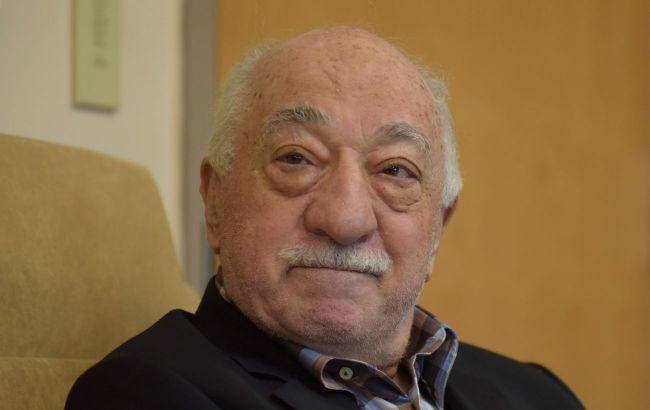Mentor turned enemy: Rise of Fethullah Gülen and why Erdoğan feared him
 Muhammad Fethullah Gülen (Getty Images)
Muhammad Fethullah Gülen (Getty Images)
Fethullah Gülen, a well-known Turkish preacher, has died. He had been labeled an enemy of Türkiye's President Recep Tayyip Erdoğan after his movement was accused of involvement in the 2016 coup attempt.
More on Gülen's life and why Erdoğan feared him can be found in the RBC-Ukraine article below.
Biography and details of Gülen’s death
Muhammad Fethullah Gülen was a Turkish thinker, theologian, preacher, and imam. He was the founder of the Hizmet movement (meaning "service" in Turkish), which aimed to raise a new generation of Muslims dedicated to serving society. This movement is also known as the "Gülenist movement."
Born in 1941 in the village of Korucuk (Türkiye), Gülen received a religious education and worked as an imam (the leader of a Muslim community and a person who leads prayers in a mosque) until the late 1970s.
He later focused on writing, teaching, and preaching. His ideas gained popularity, leading to the creation of a wide network of schools, universities, media companies, and other institutions worldwide operating under the banner of the Hizmet movement.
Gülen gave sermons in major cities and became a public figure in Türkiye over the years. His sermons promoted education, not only in traditional Islamic sciences but also in natural sciences, and focused on enlightenment.
Gülen passed away on Sunday evening at the age of 83 in Pennsylvania (USA). His followers were the first to report the news, and the information was later confirmed by his nephew, Ebussame Gülen, according to CNN Türk.
According to data published on the website Herkul.org, managed by Gülen's associates, he died in a hospital, and his death was confirmed on October 20 at 9:20 PM. It was reported that "his doctors will make a statement soon." The news was later picked up by leading Turkish media outlets.
No further details have been provided, although it is known that he had undergone heart surgery and numerous operations due to diabetes and other health issues.
Why Erdoğan feared him
Recep Tayyip Erdoğan, the current president of Türkiye, had long been friends with Fethullah Gülen. However, when Erdoğan founded his political party (the Justice and Development Party), Gülen was already the leader of a mass movement. Today, approximately 1,400 schools opened by Gülen’s followers operate in more than 150 countries.
Erdoğan used to refer to Gülen as "Hoca" (meaning "mentor" or "teacher"). Gülen's followers, in turn, supported Erdoğan's party in all elections since 2002. The media linked to Gülen became some of the most influential in Türkiye, praising Erdoğan while sharply criticizing the opposition.
Moreover, Erdoğan was considered a representative of the "cemaat" (religious community), although he was not a member (he belonged to another movement, "Milli Görüş"). However, he did promise several ministerial positions to members of the cemaat. The Gülenists took control of key sectors, including education and culture, not only within Türkiye but abroad.
In Türkiye, with the support of the cemaat, Erdoğan managed to achieve the unthinkable — the military was removed from power. However, once this issue was resolved, signs of a rift between Erdoğan and Gülen began to appear. The reasons for their falling out remain unclear.
Erdoğan’s inner circle claims that the Gülenists "went too far" by creating a parallel state within the country, infiltrating all ministries and security agencies, and seizing control of the media.
The rift between Erdoğan and Gülen occurred in the 2000s. Gülen went to the US for medical treatment and stayed there, fearing persecution by Turkish authorities, who accused him of orchestrating the failed military coup in 2016.
During the coup, armed individuals and tanks appeared on the streets of Istanbul and Ankara, while military planes flew overhead. More than 250 people died, and many soldiers were lynched.
Erdoğan accused Gülen’s followers of being behind the plot. After the coup was suppressed, mass arrests and repressions against Gülenists followed in Türkiye. The Hizmet movement was officially declared a terrorist organization by Ankara.
Erdoğan called on the US to arrest or extradite Gülen. Washington, however, insisted that Erdoğan's government must provide evidence of Gülen’s guilt.
Turkish prosecutors in Uşak province filed an indictment in a criminal case against the Hizmet movement, seeking two life sentences and a 1,900-year prison term for Gülen. Nevertheless, Gülen agreed to stand trial if international investigators could prove his involvement in the July 2016 coup attempt.
Sources: CNN Türk, Hürriyet, Radio Free Europe/Radio Liberty, Wikipedia, and other open sources.

